NUR09722: Law and Ethical Reasoning in Nursing Practice, Report
VerifiedAdded on 2022/11/13
|22
|6413
|1
Report
AI Summary
This report delves into the crucial intersection of law and ethical reasoning within nursing practice, focusing on the Singapore context. It begins by establishing the fundamental principles of nursing ethics, emphasizing the importance of patient-centered care, maintaining patient dignity, and adhering to the Singapore Nursing Board's code of ethics. The report then presents an ethical scenario involving a 46-year-old female patient with stage IV breast cancer, exploring her rights, the challenges of palliative care, and the complexities surrounding end-of-life decisions, including the ethical implications of Advance Medical Directives (AMD) and Do Not Resuscitate (DNR) orders. The analysis includes an evaluation of the scenario, applying bioethical principles such as autonomy, beneficence, non-maleficence, and justice. It examines the rights of both the patient and healthcare providers. The report also considers the role of mental support in palliative care management and concludes with a detailed action plan, outlining steps to respect patient values, promote autonomy, protect privacy, advocate for justice, and maintain ethical standards. The report emphasizes the need for clear communication, informed consent, and the ethical responsibilities of nurses in providing compassionate and legally sound care.
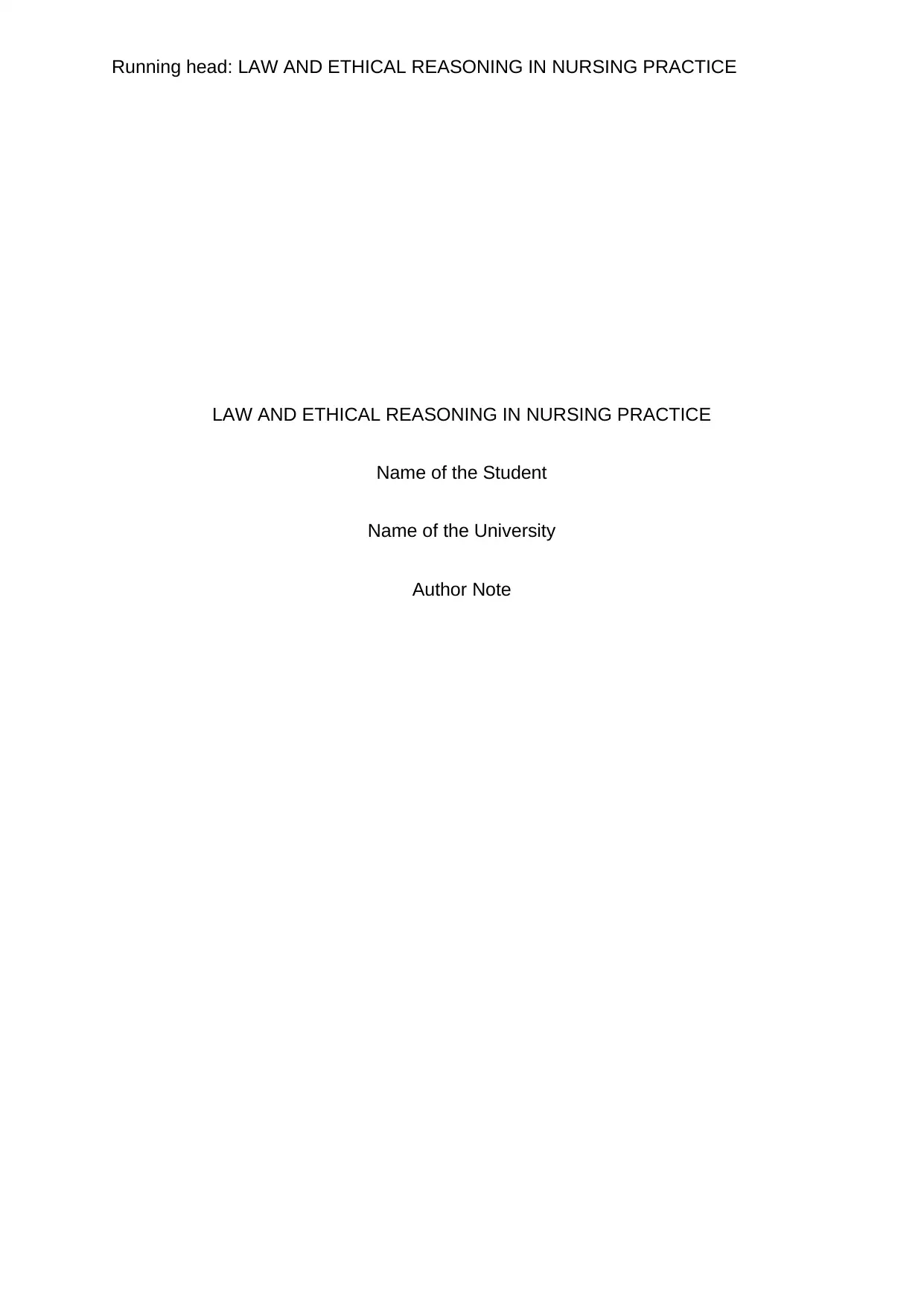
Running head: LAW AND ETHICAL REASONING IN NURSING PRACTICE
LAW AND ETHICAL REASONING IN NURSING PRACTICE
Name of the Student
Name of the University
Author Note
LAW AND ETHICAL REASONING IN NURSING PRACTICE
Name of the Student
Name of the University
Author Note
Paraphrase This Document
Need a fresh take? Get an instant paraphrase of this document with our AI Paraphraser
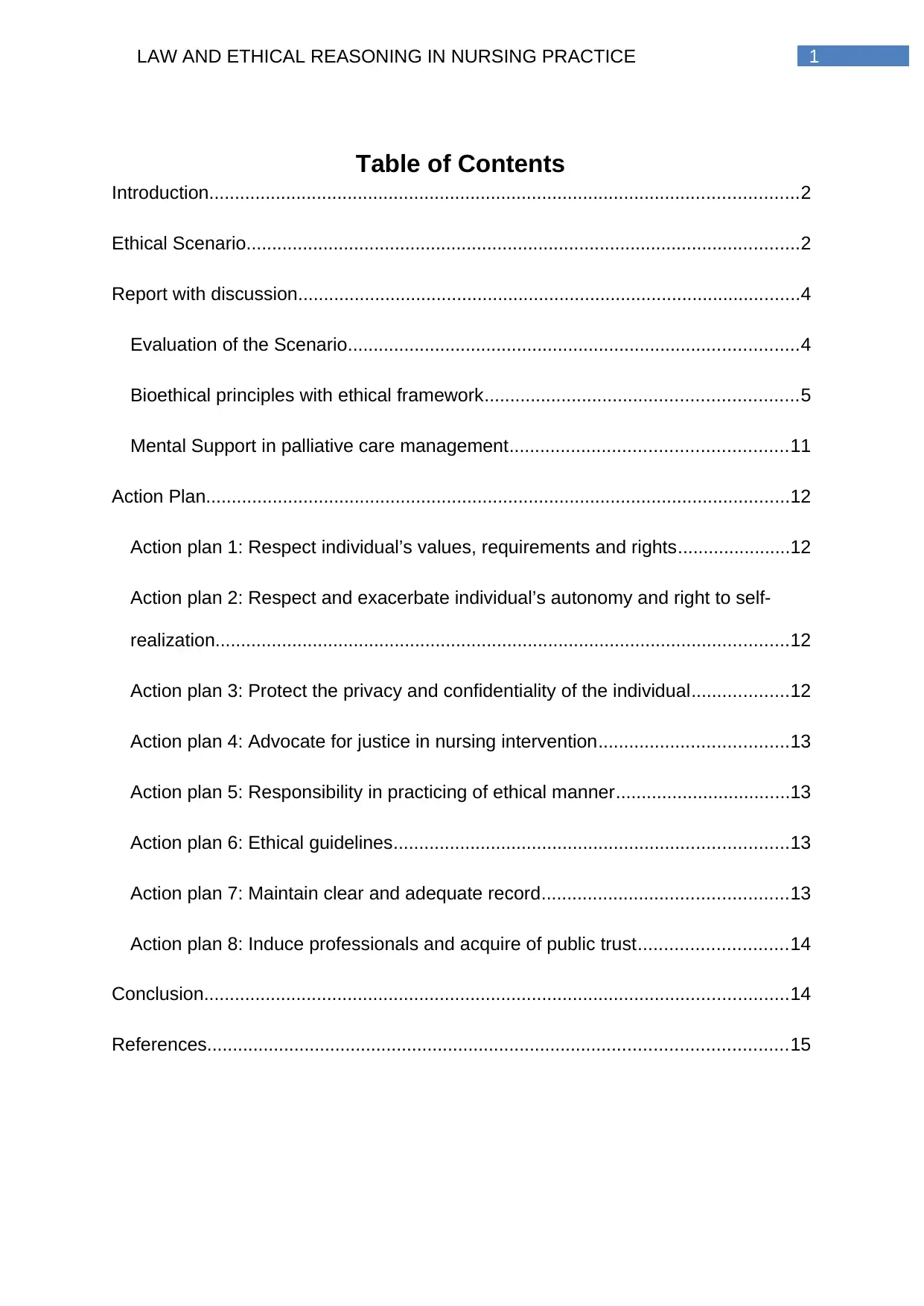
1LAW AND ETHICAL REASONING IN NURSING PRACTICE
Table of Contents
Introduction...................................................................................................................2
Ethical Scenario............................................................................................................2
Report with discussion..................................................................................................4
Evaluation of the Scenario........................................................................................4
Bioethical principles with ethical framework.............................................................5
Mental Support in palliative care management......................................................11
Action Plan..................................................................................................................12
Action plan 1: Respect individual’s values, requirements and rights......................12
Action plan 2: Respect and exacerbate individual’s autonomy and right to self-
realization................................................................................................................12
Action plan 3: Protect the privacy and confidentiality of the individual...................12
Action plan 4: Advocate for justice in nursing intervention.....................................13
Action plan 5: Responsibility in practicing of ethical manner..................................13
Action plan 6: Ethical guidelines.............................................................................13
Action plan 7: Maintain clear and adequate record................................................13
Action plan 8: Induce professionals and acquire of public trust.............................14
Conclusion..................................................................................................................14
References.................................................................................................................15
Table of Contents
Introduction...................................................................................................................2
Ethical Scenario............................................................................................................2
Report with discussion..................................................................................................4
Evaluation of the Scenario........................................................................................4
Bioethical principles with ethical framework.............................................................5
Mental Support in palliative care management......................................................11
Action Plan..................................................................................................................12
Action plan 1: Respect individual’s values, requirements and rights......................12
Action plan 2: Respect and exacerbate individual’s autonomy and right to self-
realization................................................................................................................12
Action plan 3: Protect the privacy and confidentiality of the individual...................12
Action plan 4: Advocate for justice in nursing intervention.....................................13
Action plan 5: Responsibility in practicing of ethical manner..................................13
Action plan 6: Ethical guidelines.............................................................................13
Action plan 7: Maintain clear and adequate record................................................13
Action plan 8: Induce professionals and acquire of public trust.............................14
Conclusion..................................................................................................................14
References.................................................................................................................15
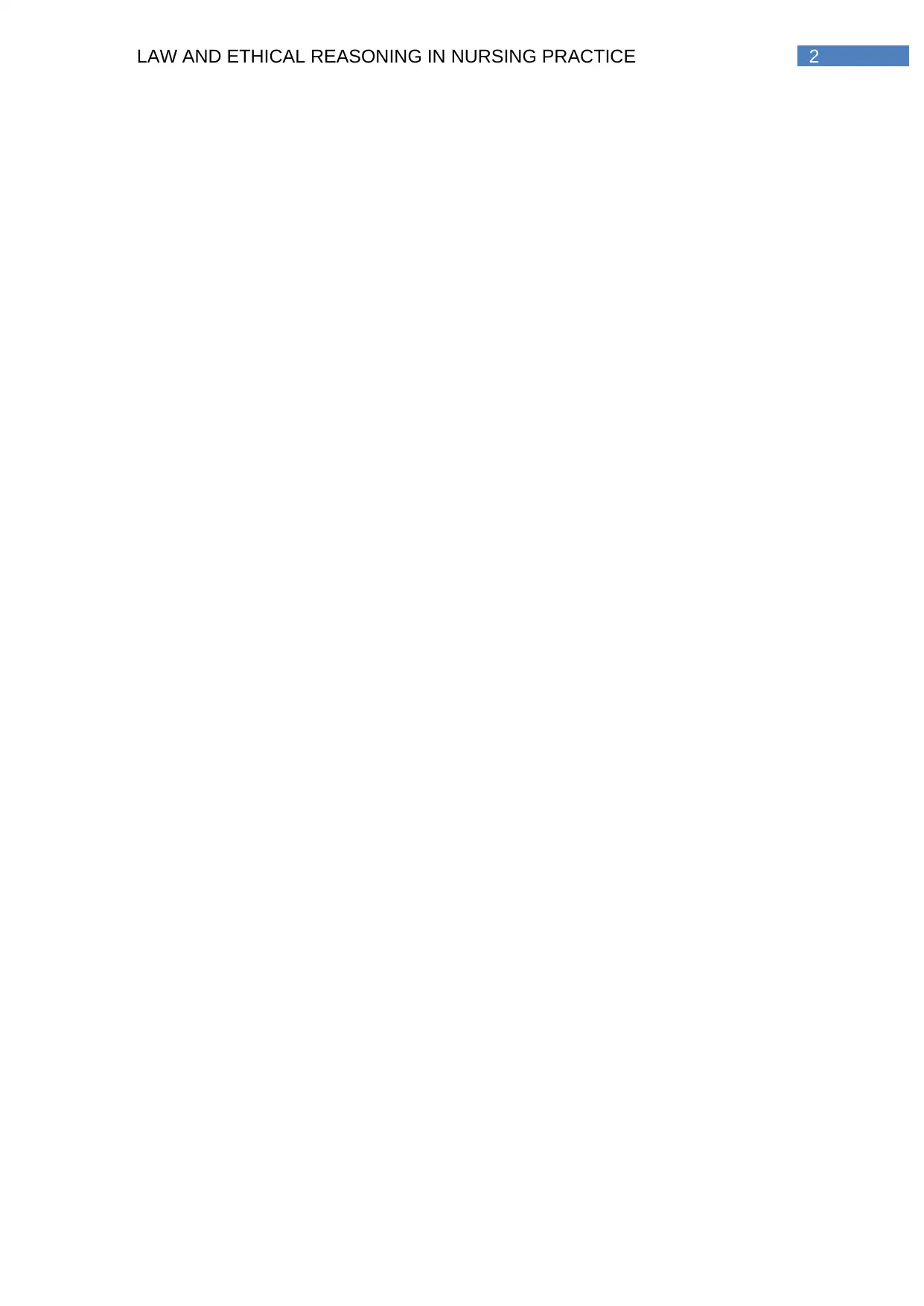
2LAW AND ETHICAL REASONING IN NURSING PRACTICE
⊘ This is a preview!⊘
Do you want full access?
Subscribe today to unlock all pages.

Trusted by 1+ million students worldwide
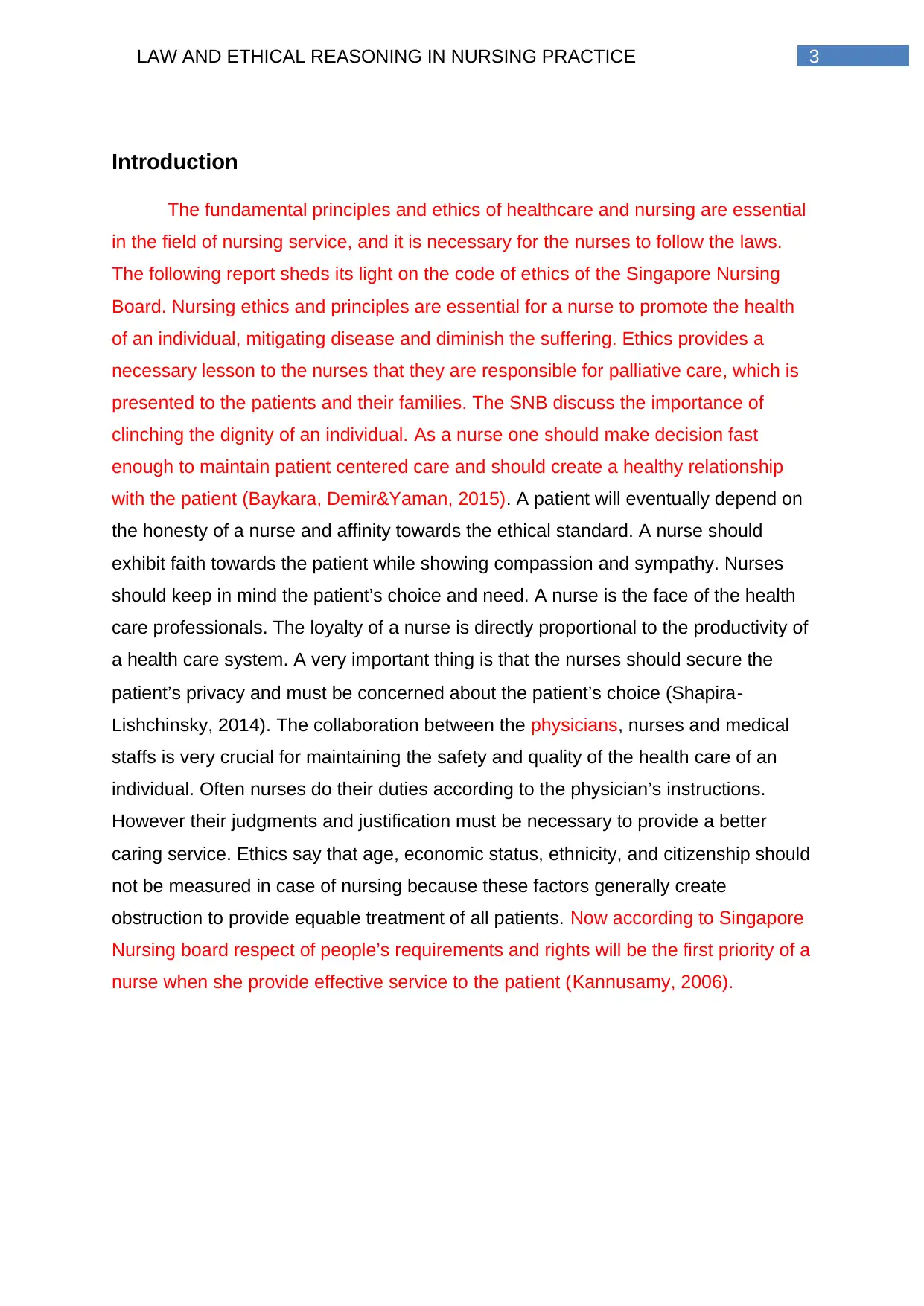
3LAW AND ETHICAL REASONING IN NURSING PRACTICE
Introduction
The fundamental principles and ethics of healthcare and nursing are essential
in the field of nursing service, and it is necessary for the nurses to follow the laws.
The following report sheds its light on the code of ethics of the Singapore Nursing
Board. Nursing ethics and principles are essential for a nurse to promote the health
of an individual, mitigating disease and diminish the suffering. Ethics provides a
necessary lesson to the nurses that they are responsible for palliative care, which is
presented to the patients and their families. The SNB discuss the importance of
clinching the dignity of an individual. As a nurse one should make decision fast
enough to maintain patient centered care and should create a healthy relationship
with the patient (Baykara, Demir&Yaman, 2015). A patient will eventually depend on
the honesty of a nurse and affinity towards the ethical standard. A nurse should
exhibit faith towards the patient while showing compassion and sympathy. Nurses
should keep in mind the patient’s choice and need. A nurse is the face of the health
care professionals. The loyalty of a nurse is directly proportional to the productivity of
a health care system. A very important thing is that the nurses should secure the
patient’s privacy and must be concerned about the patient’s choice (Shapira‐
Lishchinsky, 2014). The collaboration between the physicians, nurses and medical
staffs is very crucial for maintaining the safety and quality of the health care of an
individual. Often nurses do their duties according to the physician’s instructions.
However their judgments and justification must be necessary to provide a better
caring service. Ethics say that age, economic status, ethnicity, and citizenship should
not be measured in case of nursing because these factors generally create
obstruction to provide equable treatment of all patients. Now according to Singapore
Nursing board respect of people’s requirements and rights will be the first priority of a
nurse when she provide effective service to the patient (Kannusamy, 2006).
Introduction
The fundamental principles and ethics of healthcare and nursing are essential
in the field of nursing service, and it is necessary for the nurses to follow the laws.
The following report sheds its light on the code of ethics of the Singapore Nursing
Board. Nursing ethics and principles are essential for a nurse to promote the health
of an individual, mitigating disease and diminish the suffering. Ethics provides a
necessary lesson to the nurses that they are responsible for palliative care, which is
presented to the patients and their families. The SNB discuss the importance of
clinching the dignity of an individual. As a nurse one should make decision fast
enough to maintain patient centered care and should create a healthy relationship
with the patient (Baykara, Demir&Yaman, 2015). A patient will eventually depend on
the honesty of a nurse and affinity towards the ethical standard. A nurse should
exhibit faith towards the patient while showing compassion and sympathy. Nurses
should keep in mind the patient’s choice and need. A nurse is the face of the health
care professionals. The loyalty of a nurse is directly proportional to the productivity of
a health care system. A very important thing is that the nurses should secure the
patient’s privacy and must be concerned about the patient’s choice (Shapira‐
Lishchinsky, 2014). The collaboration between the physicians, nurses and medical
staffs is very crucial for maintaining the safety and quality of the health care of an
individual. Often nurses do their duties according to the physician’s instructions.
However their judgments and justification must be necessary to provide a better
caring service. Ethics say that age, economic status, ethnicity, and citizenship should
not be measured in case of nursing because these factors generally create
obstruction to provide equable treatment of all patients. Now according to Singapore
Nursing board respect of people’s requirements and rights will be the first priority of a
nurse when she provide effective service to the patient (Kannusamy, 2006).
Paraphrase This Document
Need a fresh take? Get an instant paraphrase of this document with our AI Paraphraser
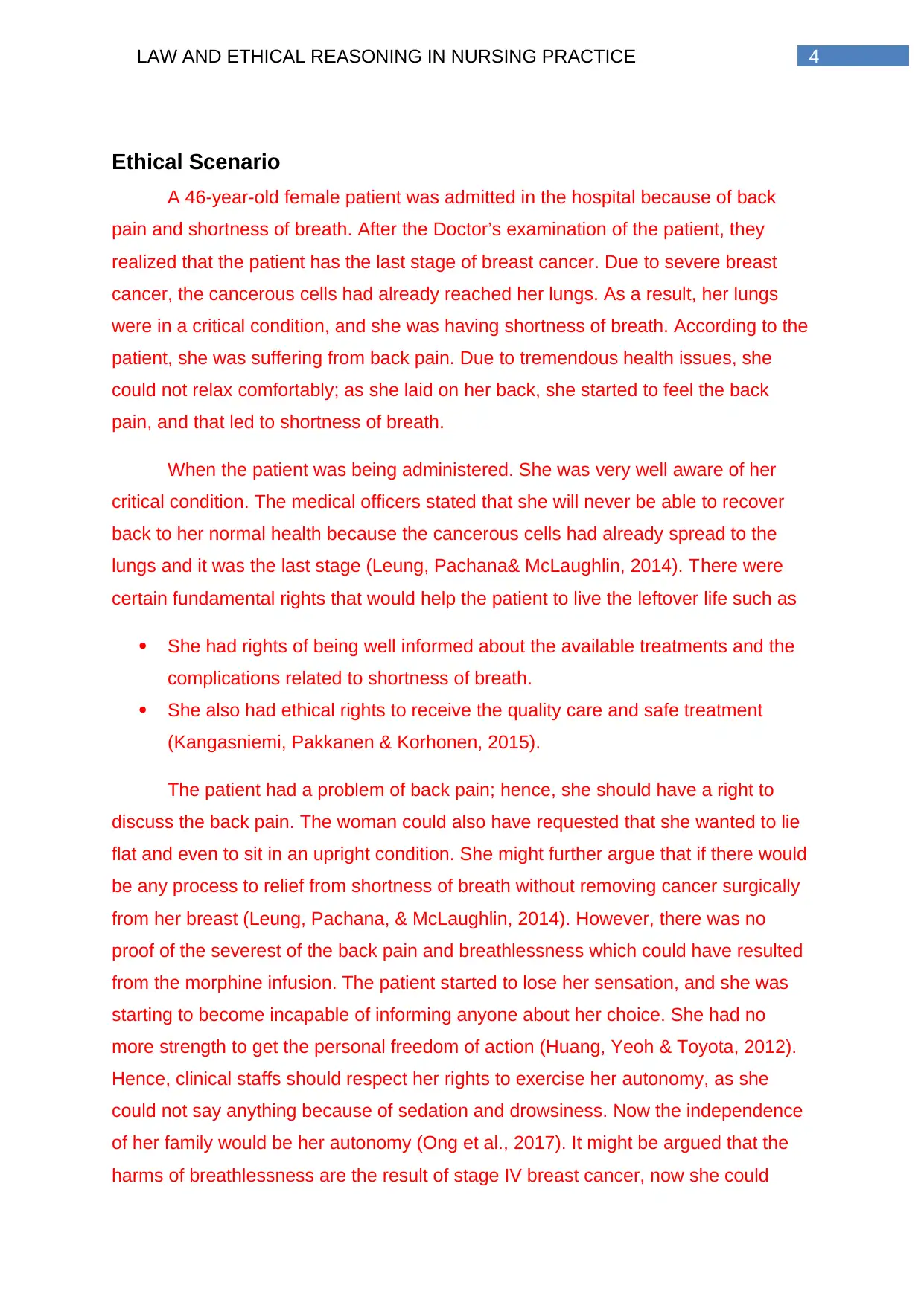
4LAW AND ETHICAL REASONING IN NURSING PRACTICE
Ethical Scenario
A 46-year-old female patient was admitted in the hospital because of back
pain and shortness of breath. After the Doctor’s examination of the patient, they
realized that the patient has the last stage of breast cancer. Due to severe breast
cancer, the cancerous cells had already reached her lungs. As a result, her lungs
were in a critical condition, and she was having shortness of breath. According to the
patient, she was suffering from back pain. Due to tremendous health issues, she
could not relax comfortably; as she laid on her back, she started to feel the back
pain, and that led to shortness of breath.
When the patient was being administered. She was very well aware of her
critical condition. The medical officers stated that she will never be able to recover
back to her normal health because the cancerous cells had already spread to the
lungs and it was the last stage (Leung, Pachana& McLaughlin, 2014). There were
certain fundamental rights that would help the patient to live the leftover life such as
She had rights of being well informed about the available treatments and the
complications related to shortness of breath.
She also had ethical rights to receive the quality care and safe treatment
(Kangasniemi, Pakkanen & Korhonen, 2015).
The patient had a problem of back pain; hence, she should have a right to
discuss the back pain. The woman could also have requested that she wanted to lie
flat and even to sit in an upright condition. She might further argue that if there would
be any process to relief from shortness of breath without removing cancer surgically
from her breast (Leung, Pachana, & McLaughlin, 2014). However, there was no
proof of the severest of the back pain and breathlessness which could have resulted
from the morphine infusion. The patient started to lose her sensation, and she was
starting to become incapable of informing anyone about her choice. She had no
more strength to get the personal freedom of action (Huang, Yeoh & Toyota, 2012).
Hence, clinical staffs should respect her rights to exercise her autonomy, as she
could not say anything because of sedation and drowsiness. Now the independence
of her family would be her autonomy (Ong et al., 2017). It might be argued that the
harms of breathlessness are the result of stage IV breast cancer, now she could
Ethical Scenario
A 46-year-old female patient was admitted in the hospital because of back
pain and shortness of breath. After the Doctor’s examination of the patient, they
realized that the patient has the last stage of breast cancer. Due to severe breast
cancer, the cancerous cells had already reached her lungs. As a result, her lungs
were in a critical condition, and she was having shortness of breath. According to the
patient, she was suffering from back pain. Due to tremendous health issues, she
could not relax comfortably; as she laid on her back, she started to feel the back
pain, and that led to shortness of breath.
When the patient was being administered. She was very well aware of her
critical condition. The medical officers stated that she will never be able to recover
back to her normal health because the cancerous cells had already spread to the
lungs and it was the last stage (Leung, Pachana& McLaughlin, 2014). There were
certain fundamental rights that would help the patient to live the leftover life such as
She had rights of being well informed about the available treatments and the
complications related to shortness of breath.
She also had ethical rights to receive the quality care and safe treatment
(Kangasniemi, Pakkanen & Korhonen, 2015).
The patient had a problem of back pain; hence, she should have a right to
discuss the back pain. The woman could also have requested that she wanted to lie
flat and even to sit in an upright condition. She might further argue that if there would
be any process to relief from shortness of breath without removing cancer surgically
from her breast (Leung, Pachana, & McLaughlin, 2014). However, there was no
proof of the severest of the back pain and breathlessness which could have resulted
from the morphine infusion. The patient started to lose her sensation, and she was
starting to become incapable of informing anyone about her choice. She had no
more strength to get the personal freedom of action (Huang, Yeoh & Toyota, 2012).
Hence, clinical staffs should respect her rights to exercise her autonomy, as she
could not say anything because of sedation and drowsiness. Now the independence
of her family would be her autonomy (Ong et al., 2017). It might be argued that the
harms of breathlessness are the result of stage IV breast cancer, now she could
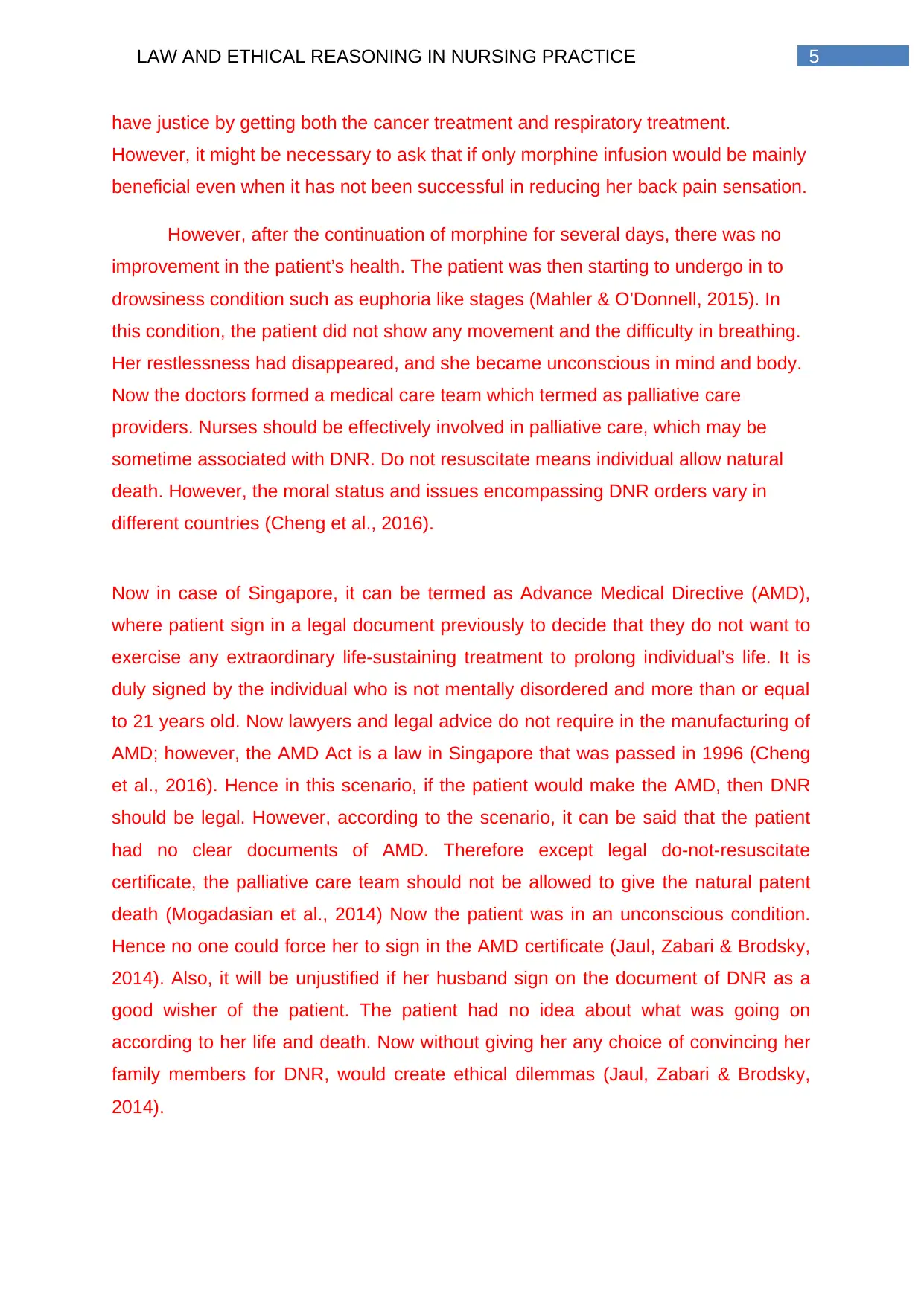
5LAW AND ETHICAL REASONING IN NURSING PRACTICE
have justice by getting both the cancer treatment and respiratory treatment.
However, it might be necessary to ask that if only morphine infusion would be mainly
beneficial even when it has not been successful in reducing her back pain sensation.
However, after the continuation of morphine for several days, there was no
improvement in the patient’s health. The patient was then starting to undergo in to
drowsiness condition such as euphoria like stages (Mahler & O’Donnell, 2015). In
this condition, the patient did not show any movement and the difficulty in breathing.
Her restlessness had disappeared, and she became unconscious in mind and body.
Now the doctors formed a medical care team which termed as palliative care
providers. Nurses should be effectively involved in palliative care, which may be
sometime associated with DNR. Do not resuscitate means individual allow natural
death. However, the moral status and issues encompassing DNR orders vary in
different countries (Cheng et al., 2016).
Now in case of Singapore, it can be termed as Advance Medical Directive (AMD),
where patient sign in a legal document previously to decide that they do not want to
exercise any extraordinary life-sustaining treatment to prolong individual’s life. It is
duly signed by the individual who is not mentally disordered and more than or equal
to 21 years old. Now lawyers and legal advice do not require in the manufacturing of
AMD; however, the AMD Act is a law in Singapore that was passed in 1996 (Cheng
et al., 2016). Hence in this scenario, if the patient would make the AMD, then DNR
should be legal. However, according to the scenario, it can be said that the patient
had no clear documents of AMD. Therefore except legal do-not-resuscitate
certificate, the palliative care team should not be allowed to give the natural patent
death (Mogadasian et al., 2014) Now the patient was in an unconscious condition.
Hence no one could force her to sign in the AMD certificate (Jaul, Zabari & Brodsky,
2014). Also, it will be unjustified if her husband sign on the document of DNR as a
good wisher of the patient. The patient had no idea about what was going on
according to her life and death. Now without giving her any choice of convincing her
family members for DNR, would create ethical dilemmas (Jaul, Zabari & Brodsky,
2014).
have justice by getting both the cancer treatment and respiratory treatment.
However, it might be necessary to ask that if only morphine infusion would be mainly
beneficial even when it has not been successful in reducing her back pain sensation.
However, after the continuation of morphine for several days, there was no
improvement in the patient’s health. The patient was then starting to undergo in to
drowsiness condition such as euphoria like stages (Mahler & O’Donnell, 2015). In
this condition, the patient did not show any movement and the difficulty in breathing.
Her restlessness had disappeared, and she became unconscious in mind and body.
Now the doctors formed a medical care team which termed as palliative care
providers. Nurses should be effectively involved in palliative care, which may be
sometime associated with DNR. Do not resuscitate means individual allow natural
death. However, the moral status and issues encompassing DNR orders vary in
different countries (Cheng et al., 2016).
Now in case of Singapore, it can be termed as Advance Medical Directive (AMD),
where patient sign in a legal document previously to decide that they do not want to
exercise any extraordinary life-sustaining treatment to prolong individual’s life. It is
duly signed by the individual who is not mentally disordered and more than or equal
to 21 years old. Now lawyers and legal advice do not require in the manufacturing of
AMD; however, the AMD Act is a law in Singapore that was passed in 1996 (Cheng
et al., 2016). Hence in this scenario, if the patient would make the AMD, then DNR
should be legal. However, according to the scenario, it can be said that the patient
had no clear documents of AMD. Therefore except legal do-not-resuscitate
certificate, the palliative care team should not be allowed to give the natural patent
death (Mogadasian et al., 2014) Now the patient was in an unconscious condition.
Hence no one could force her to sign in the AMD certificate (Jaul, Zabari & Brodsky,
2014). Also, it will be unjustified if her husband sign on the document of DNR as a
good wisher of the patient. The patient had no idea about what was going on
according to her life and death. Now without giving her any choice of convincing her
family members for DNR, would create ethical dilemmas (Jaul, Zabari & Brodsky,
2014).
⊘ This is a preview!⊘
Do you want full access?
Subscribe today to unlock all pages.

Trusted by 1+ million students worldwide
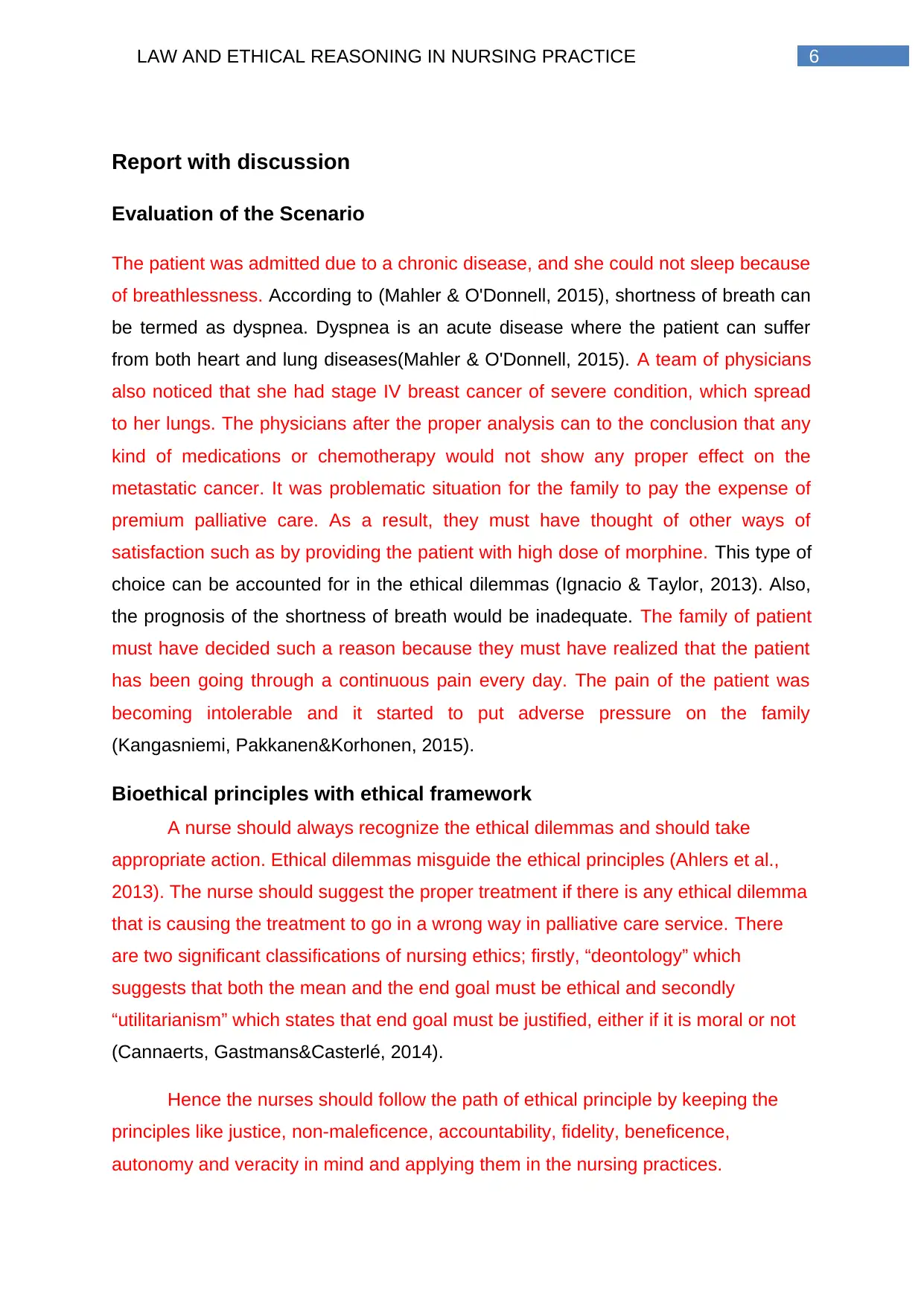
6LAW AND ETHICAL REASONING IN NURSING PRACTICE
Report with discussion
Evaluation of the Scenario
The patient was admitted due to a chronic disease, and she could not sleep because
of breathlessness. According to (Mahler & O'Donnell, 2015), shortness of breath can
be termed as dyspnea. Dyspnea is an acute disease where the patient can suffer
from both heart and lung diseases(Mahler & O'Donnell, 2015). A team of physicians
also noticed that she had stage IV breast cancer of severe condition, which spread
to her lungs. The physicians after the proper analysis can to the conclusion that any
kind of medications or chemotherapy would not show any proper effect on the
metastatic cancer. It was problematic situation for the family to pay the expense of
premium palliative care. As a result, they must have thought of other ways of
satisfaction such as by providing the patient with high dose of morphine. This type of
choice can be accounted for in the ethical dilemmas (Ignacio & Taylor, 2013). Also,
the prognosis of the shortness of breath would be inadequate. The family of patient
must have decided such a reason because they must have realized that the patient
has been going through a continuous pain every day. The pain of the patient was
becoming intolerable and it started to put adverse pressure on the family
(Kangasniemi, Pakkanen&Korhonen, 2015).
Bioethical principles with ethical framework
A nurse should always recognize the ethical dilemmas and should take
appropriate action. Ethical dilemmas misguide the ethical principles (Ahlers et al.,
2013). The nurse should suggest the proper treatment if there is any ethical dilemma
that is causing the treatment to go in a wrong way in palliative care service. There
are two significant classifications of nursing ethics; firstly, “deontology” which
suggests that both the mean and the end goal must be ethical and secondly
“utilitarianism” which states that end goal must be justified, either if it is moral or not
(Cannaerts, Gastmans&Casterlé, 2014).
Hence the nurses should follow the path of ethical principle by keeping the
principles like justice, non-maleficence, accountability, fidelity, beneficence,
autonomy and veracity in mind and applying them in the nursing practices.
Report with discussion
Evaluation of the Scenario
The patient was admitted due to a chronic disease, and she could not sleep because
of breathlessness. According to (Mahler & O'Donnell, 2015), shortness of breath can
be termed as dyspnea. Dyspnea is an acute disease where the patient can suffer
from both heart and lung diseases(Mahler & O'Donnell, 2015). A team of physicians
also noticed that she had stage IV breast cancer of severe condition, which spread
to her lungs. The physicians after the proper analysis can to the conclusion that any
kind of medications or chemotherapy would not show any proper effect on the
metastatic cancer. It was problematic situation for the family to pay the expense of
premium palliative care. As a result, they must have thought of other ways of
satisfaction such as by providing the patient with high dose of morphine. This type of
choice can be accounted for in the ethical dilemmas (Ignacio & Taylor, 2013). Also,
the prognosis of the shortness of breath would be inadequate. The family of patient
must have decided such a reason because they must have realized that the patient
has been going through a continuous pain every day. The pain of the patient was
becoming intolerable and it started to put adverse pressure on the family
(Kangasniemi, Pakkanen&Korhonen, 2015).
Bioethical principles with ethical framework
A nurse should always recognize the ethical dilemmas and should take
appropriate action. Ethical dilemmas misguide the ethical principles (Ahlers et al.,
2013). The nurse should suggest the proper treatment if there is any ethical dilemma
that is causing the treatment to go in a wrong way in palliative care service. There
are two significant classifications of nursing ethics; firstly, “deontology” which
suggests that both the mean and the end goal must be ethical and secondly
“utilitarianism” which states that end goal must be justified, either if it is moral or not
(Cannaerts, Gastmans&Casterlé, 2014).
Hence the nurses should follow the path of ethical principle by keeping the
principles like justice, non-maleficence, accountability, fidelity, beneficence,
autonomy and veracity in mind and applying them in the nursing practices.
Paraphrase This Document
Need a fresh take? Get an instant paraphrase of this document with our AI Paraphraser
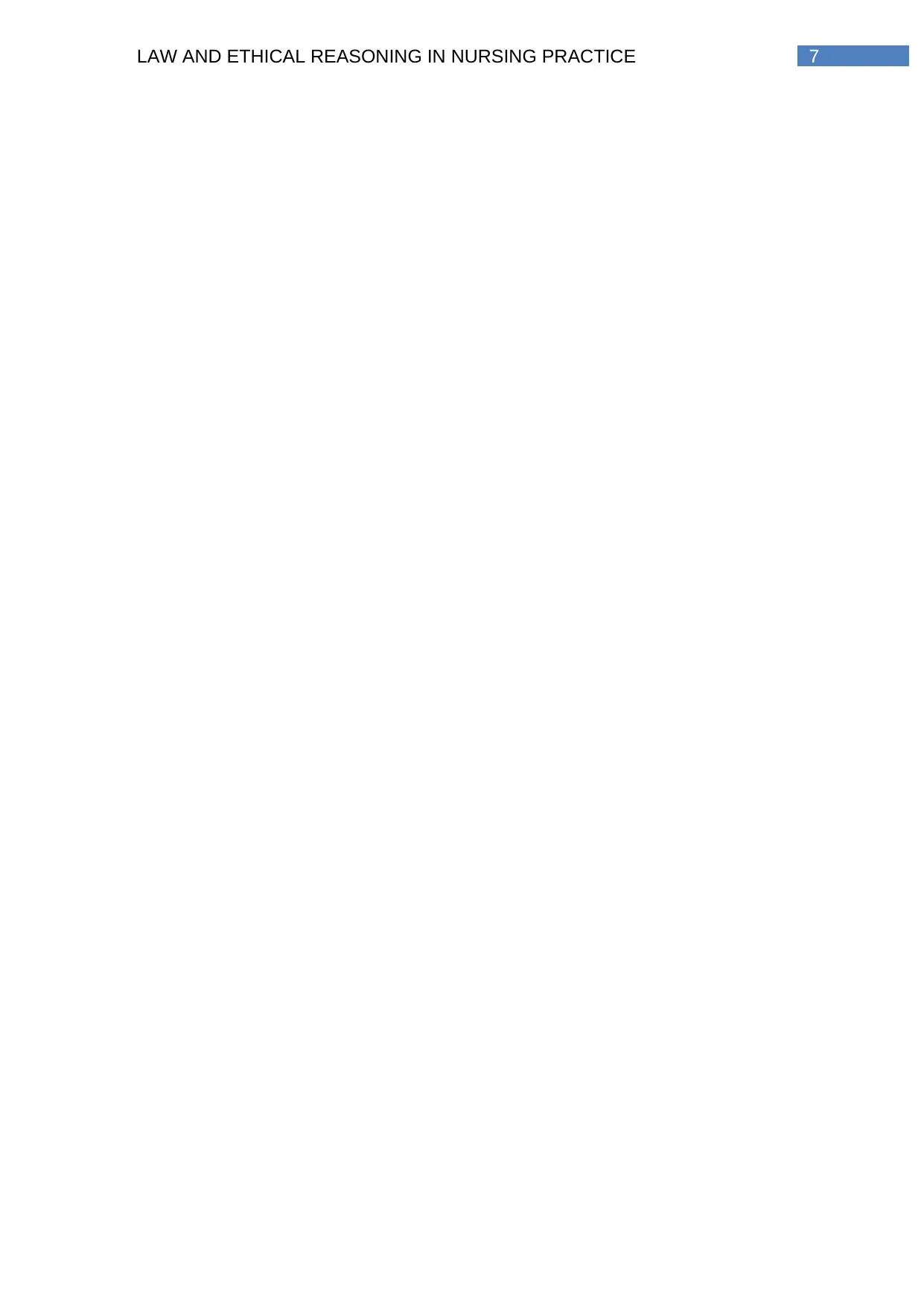
7LAW AND ETHICAL REASONING IN NURSING PRACTICE
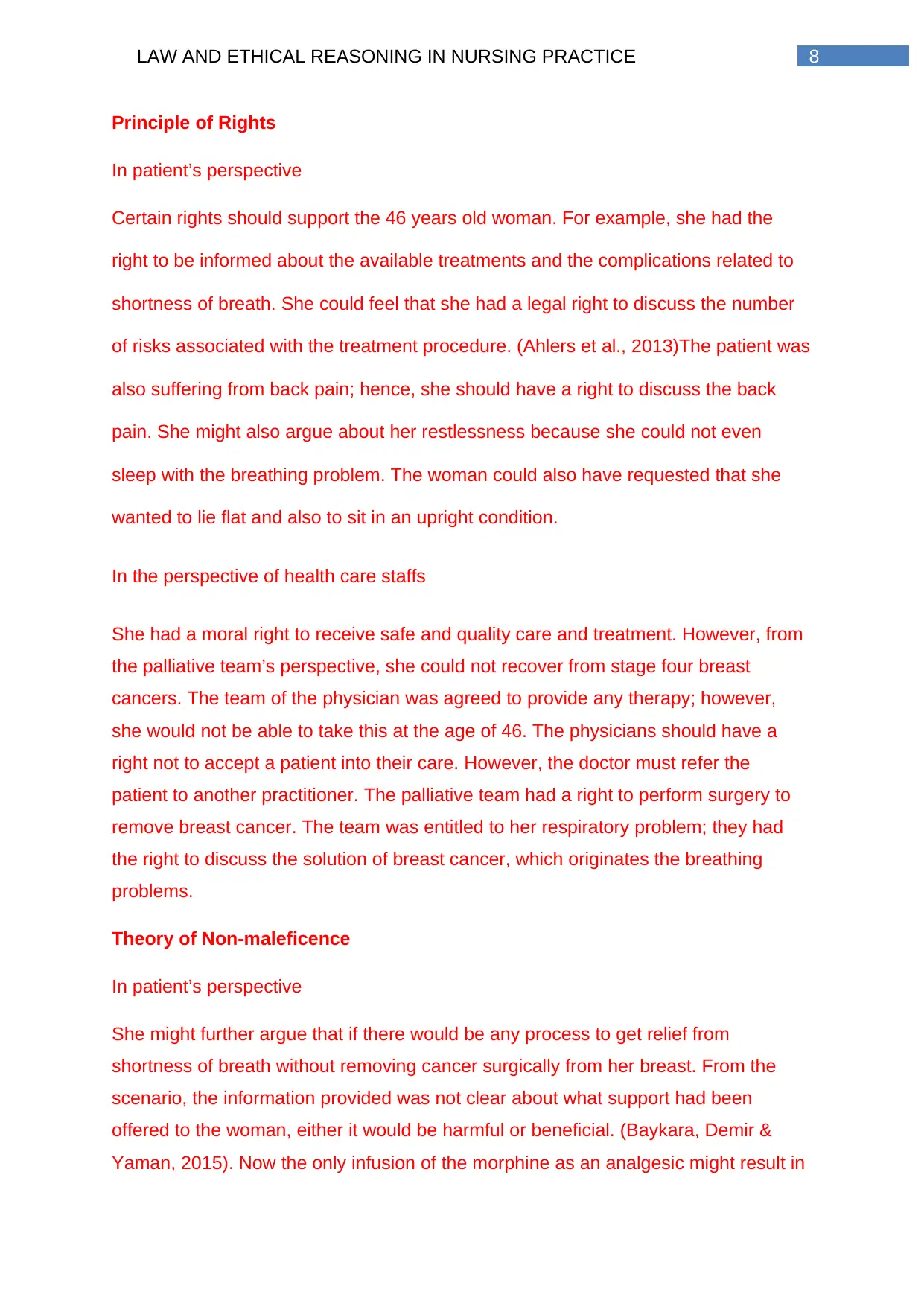
8LAW AND ETHICAL REASONING IN NURSING PRACTICE
Principle of Rights
In patient’s perspective
Certain rights should support the 46 years old woman. For example, she had the
right to be informed about the available treatments and the complications related to
shortness of breath. She could feel that she had a legal right to discuss the number
of risks associated with the treatment procedure. (Ahlers et al., 2013)The patient was
also suffering from back pain; hence, she should have a right to discuss the back
pain. She might also argue about her restlessness because she could not even
sleep with the breathing problem. The woman could also have requested that she
wanted to lie flat and also to sit in an upright condition.
In the perspective of health care staffs
She had a moral right to receive safe and quality care and treatment. However, from
the palliative team’s perspective, she could not recover from stage four breast
cancers. The team of the physician was agreed to provide any therapy; however,
she would not be able to take this at the age of 46. The physicians should have a
right not to accept a patient into their care. However, the doctor must refer the
patient to another practitioner. The palliative team had a right to perform surgery to
remove breast cancer. The team was entitled to her respiratory problem; they had
the right to discuss the solution of breast cancer, which originates the breathing
problems.
Theory of Non-maleficence
In patient’s perspective
She might further argue that if there would be any process to get relief from
shortness of breath without removing cancer surgically from her breast. From the
scenario, the information provided was not clear about what support had been
offered to the woman, either it would be harmful or beneficial. (Baykara, Demir &
Yaman, 2015). Now the only infusion of the morphine as an analgesic might result in
Principle of Rights
In patient’s perspective
Certain rights should support the 46 years old woman. For example, she had the
right to be informed about the available treatments and the complications related to
shortness of breath. She could feel that she had a legal right to discuss the number
of risks associated with the treatment procedure. (Ahlers et al., 2013)The patient was
also suffering from back pain; hence, she should have a right to discuss the back
pain. She might also argue about her restlessness because she could not even
sleep with the breathing problem. The woman could also have requested that she
wanted to lie flat and also to sit in an upright condition.
In the perspective of health care staffs
She had a moral right to receive safe and quality care and treatment. However, from
the palliative team’s perspective, she could not recover from stage four breast
cancers. The team of the physician was agreed to provide any therapy; however,
she would not be able to take this at the age of 46. The physicians should have a
right not to accept a patient into their care. However, the doctor must refer the
patient to another practitioner. The palliative team had a right to perform surgery to
remove breast cancer. The team was entitled to her respiratory problem; they had
the right to discuss the solution of breast cancer, which originates the breathing
problems.
Theory of Non-maleficence
In patient’s perspective
She might further argue that if there would be any process to get relief from
shortness of breath without removing cancer surgically from her breast. From the
scenario, the information provided was not clear about what support had been
offered to the woman, either it would be harmful or beneficial. (Baykara, Demir &
Yaman, 2015). Now the only infusion of the morphine as an analgesic might result in
⊘ This is a preview!⊘
Do you want full access?
Subscribe today to unlock all pages.

Trusted by 1+ million students worldwide
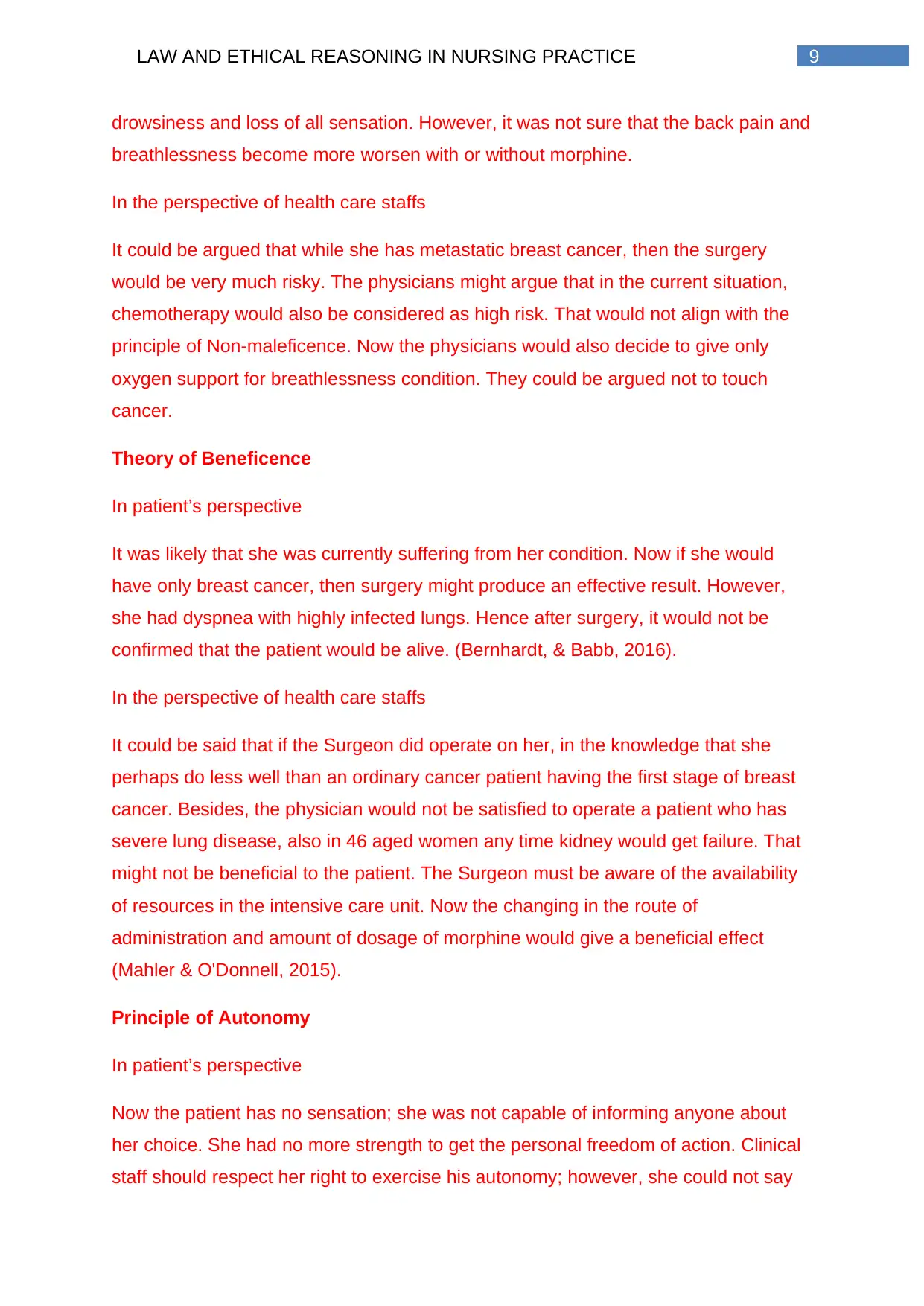
9LAW AND ETHICAL REASONING IN NURSING PRACTICE
drowsiness and loss of all sensation. However, it was not sure that the back pain and
breathlessness become more worsen with or without morphine.
In the perspective of health care staffs
It could be argued that while she has metastatic breast cancer, then the surgery
would be very much risky. The physicians might argue that in the current situation,
chemotherapy would also be considered as high risk. That would not align with the
principle of Non-maleficence. Now the physicians would also decide to give only
oxygen support for breathlessness condition. They could be argued not to touch
cancer.
Theory of Beneficence
In patient’s perspective
It was likely that she was currently suffering from her condition. Now if she would
have only breast cancer, then surgery might produce an effective result. However,
she had dyspnea with highly infected lungs. Hence after surgery, it would not be
confirmed that the patient would be alive. (Bernhardt, & Babb, 2016).
In the perspective of health care staffs
It could be said that if the Surgeon did operate on her, in the knowledge that she
perhaps do less well than an ordinary cancer patient having the first stage of breast
cancer. Besides, the physician would not be satisfied to operate a patient who has
severe lung disease, also in 46 aged women any time kidney would get failure. That
might not be beneficial to the patient. The Surgeon must be aware of the availability
of resources in the intensive care unit. Now the changing in the route of
administration and amount of dosage of morphine would give a beneficial effect
(Mahler & O'Donnell, 2015).
Principle of Autonomy
In patient’s perspective
Now the patient has no sensation; she was not capable of informing anyone about
her choice. She had no more strength to get the personal freedom of action. Clinical
staff should respect her right to exercise his autonomy; however, she could not say
drowsiness and loss of all sensation. However, it was not sure that the back pain and
breathlessness become more worsen with or without morphine.
In the perspective of health care staffs
It could be argued that while she has metastatic breast cancer, then the surgery
would be very much risky. The physicians might argue that in the current situation,
chemotherapy would also be considered as high risk. That would not align with the
principle of Non-maleficence. Now the physicians would also decide to give only
oxygen support for breathlessness condition. They could be argued not to touch
cancer.
Theory of Beneficence
In patient’s perspective
It was likely that she was currently suffering from her condition. Now if she would
have only breast cancer, then surgery might produce an effective result. However,
she had dyspnea with highly infected lungs. Hence after surgery, it would not be
confirmed that the patient would be alive. (Bernhardt, & Babb, 2016).
In the perspective of health care staffs
It could be said that if the Surgeon did operate on her, in the knowledge that she
perhaps do less well than an ordinary cancer patient having the first stage of breast
cancer. Besides, the physician would not be satisfied to operate a patient who has
severe lung disease, also in 46 aged women any time kidney would get failure. That
might not be beneficial to the patient. The Surgeon must be aware of the availability
of resources in the intensive care unit. Now the changing in the route of
administration and amount of dosage of morphine would give a beneficial effect
(Mahler & O'Donnell, 2015).
Principle of Autonomy
In patient’s perspective
Now the patient has no sensation; she was not capable of informing anyone about
her choice. She had no more strength to get the personal freedom of action. Clinical
staff should respect her right to exercise his autonomy; however, she could not say
Paraphrase This Document
Need a fresh take? Get an instant paraphrase of this document with our AI Paraphraser
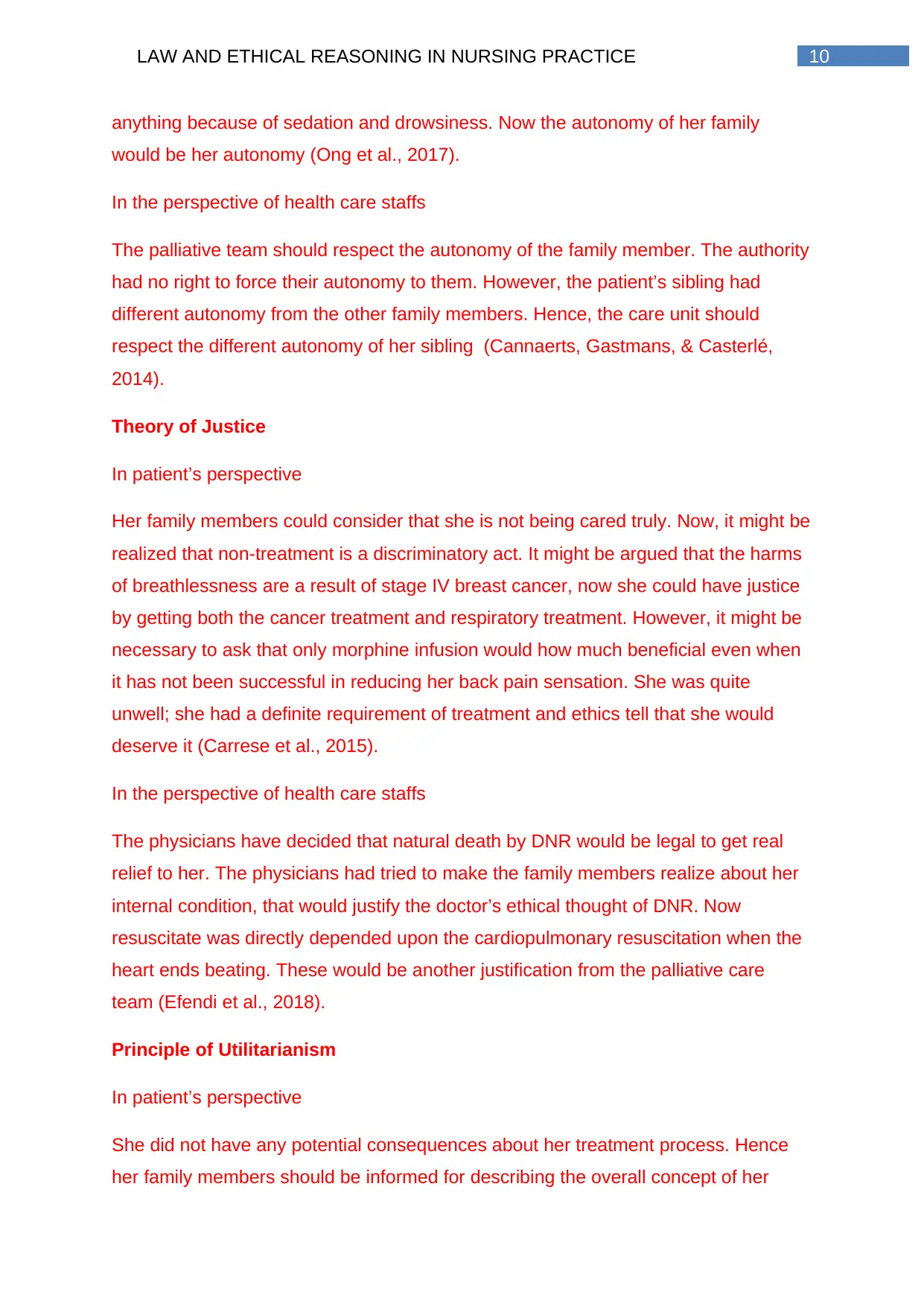
10LAW AND ETHICAL REASONING IN NURSING PRACTICE
anything because of sedation and drowsiness. Now the autonomy of her family
would be her autonomy (Ong et al., 2017).
In the perspective of health care staffs
The palliative team should respect the autonomy of the family member. The authority
had no right to force their autonomy to them. However, the patient’s sibling had
different autonomy from the other family members. Hence, the care unit should
respect the different autonomy of her sibling (Cannaerts, Gastmans, & Casterlé,
2014).
Theory of Justice
In patient’s perspective
Her family members could consider that she is not being cared truly. Now, it might be
realized that non-treatment is a discriminatory act. It might be argued that the harms
of breathlessness are a result of stage IV breast cancer, now she could have justice
by getting both the cancer treatment and respiratory treatment. However, it might be
necessary to ask that only morphine infusion would how much beneficial even when
it has not been successful in reducing her back pain sensation. She was quite
unwell; she had a definite requirement of treatment and ethics tell that she would
deserve it (Carrese et al., 2015).
In the perspective of health care staffs
The physicians have decided that natural death by DNR would be legal to get real
relief to her. The physicians had tried to make the family members realize about her
internal condition, that would justify the doctor’s ethical thought of DNR. Now
resuscitate was directly depended upon the cardiopulmonary resuscitation when the
heart ends beating. These would be another justification from the palliative care
team (Efendi et al., 2018).
Principle of Utilitarianism
In patient’s perspective
She did not have any potential consequences about her treatment process. Hence
her family members should be informed for describing the overall concept of her
anything because of sedation and drowsiness. Now the autonomy of her family
would be her autonomy (Ong et al., 2017).
In the perspective of health care staffs
The palliative team should respect the autonomy of the family member. The authority
had no right to force their autonomy to them. However, the patient’s sibling had
different autonomy from the other family members. Hence, the care unit should
respect the different autonomy of her sibling (Cannaerts, Gastmans, & Casterlé,
2014).
Theory of Justice
In patient’s perspective
Her family members could consider that she is not being cared truly. Now, it might be
realized that non-treatment is a discriminatory act. It might be argued that the harms
of breathlessness are a result of stage IV breast cancer, now she could have justice
by getting both the cancer treatment and respiratory treatment. However, it might be
necessary to ask that only morphine infusion would how much beneficial even when
it has not been successful in reducing her back pain sensation. She was quite
unwell; she had a definite requirement of treatment and ethics tell that she would
deserve it (Carrese et al., 2015).
In the perspective of health care staffs
The physicians have decided that natural death by DNR would be legal to get real
relief to her. The physicians had tried to make the family members realize about her
internal condition, that would justify the doctor’s ethical thought of DNR. Now
resuscitate was directly depended upon the cardiopulmonary resuscitation when the
heart ends beating. These would be another justification from the palliative care
team (Efendi et al., 2018).
Principle of Utilitarianism
In patient’s perspective
She did not have any potential consequences about her treatment process. Hence
her family members should be informed for describing the overall concept of her
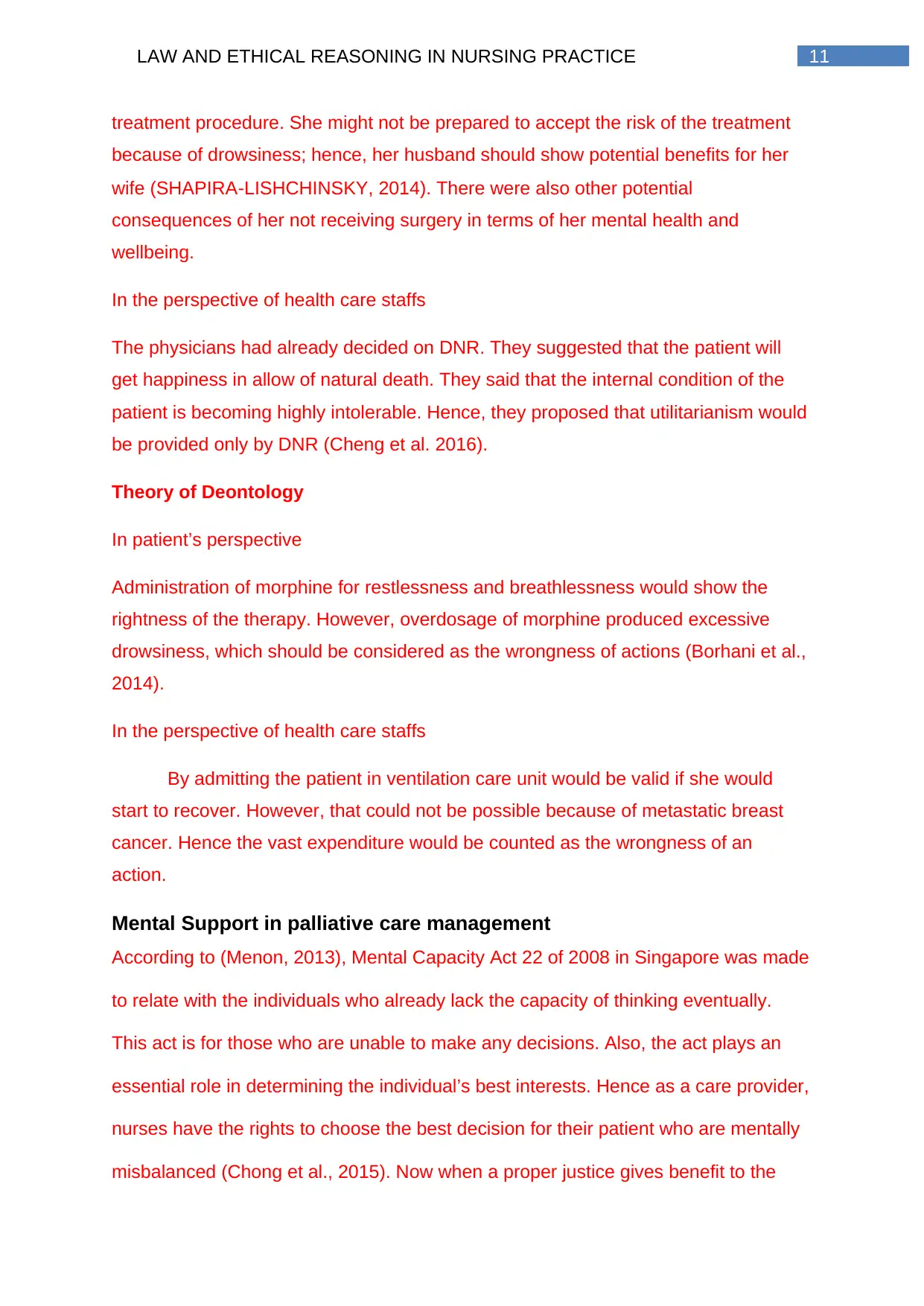
11LAW AND ETHICAL REASONING IN NURSING PRACTICE
treatment procedure. She might not be prepared to accept the risk of the treatment
because of drowsiness; hence, her husband should show potential benefits for her
wife (SHAPIRA‐LISHCHINSKY, 2014). There were also other potential
consequences of her not receiving surgery in terms of her mental health and
wellbeing.
In the perspective of health care staffs
The physicians had already decided on DNR. They suggested that the patient will
get happiness in allow of natural death. They said that the internal condition of the
patient is becoming highly intolerable. Hence, they proposed that utilitarianism would
be provided only by DNR (Cheng et al. 2016).
Theory of Deontology
In patient’s perspective
Administration of morphine for restlessness and breathlessness would show the
rightness of the therapy. However, overdosage of morphine produced excessive
drowsiness, which should be considered as the wrongness of actions (Borhani et al.,
2014).
In the perspective of health care staffs
By admitting the patient in ventilation care unit would be valid if she would
start to recover. However, that could not be possible because of metastatic breast
cancer. Hence the vast expenditure would be counted as the wrongness of an
action.
Mental Support in palliative care management
According to (Menon, 2013), Mental Capacity Act 22 of 2008 in Singapore was made
to relate with the individuals who already lack the capacity of thinking eventually.
This act is for those who are unable to make any decisions. Also, the act plays an
essential role in determining the individual’s best interests. Hence as a care provider,
nurses have the rights to choose the best decision for their patient who are mentally
misbalanced (Chong et al., 2015). Now when a proper justice gives benefit to the
treatment procedure. She might not be prepared to accept the risk of the treatment
because of drowsiness; hence, her husband should show potential benefits for her
wife (SHAPIRA‐LISHCHINSKY, 2014). There were also other potential
consequences of her not receiving surgery in terms of her mental health and
wellbeing.
In the perspective of health care staffs
The physicians had already decided on DNR. They suggested that the patient will
get happiness in allow of natural death. They said that the internal condition of the
patient is becoming highly intolerable. Hence, they proposed that utilitarianism would
be provided only by DNR (Cheng et al. 2016).
Theory of Deontology
In patient’s perspective
Administration of morphine for restlessness and breathlessness would show the
rightness of the therapy. However, overdosage of morphine produced excessive
drowsiness, which should be considered as the wrongness of actions (Borhani et al.,
2014).
In the perspective of health care staffs
By admitting the patient in ventilation care unit would be valid if she would
start to recover. However, that could not be possible because of metastatic breast
cancer. Hence the vast expenditure would be counted as the wrongness of an
action.
Mental Support in palliative care management
According to (Menon, 2013), Mental Capacity Act 22 of 2008 in Singapore was made
to relate with the individuals who already lack the capacity of thinking eventually.
This act is for those who are unable to make any decisions. Also, the act plays an
essential role in determining the individual’s best interests. Hence as a care provider,
nurses have the rights to choose the best decision for their patient who are mentally
misbalanced (Chong et al., 2015). Now when a proper justice gives benefit to the
⊘ This is a preview!⊘
Do you want full access?
Subscribe today to unlock all pages.

Trusted by 1+ million students worldwide
1 out of 22
Related Documents
Your All-in-One AI-Powered Toolkit for Academic Success.
+13062052269
info@desklib.com
Available 24*7 on WhatsApp / Email
![[object Object]](/_next/static/media/star-bottom.7253800d.svg)
Unlock your academic potential
Copyright © 2020–2026 A2Z Services. All Rights Reserved. Developed and managed by ZUCOL.





